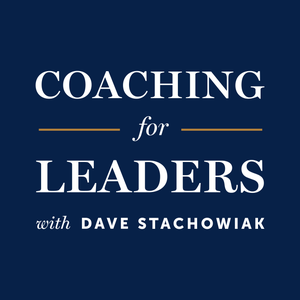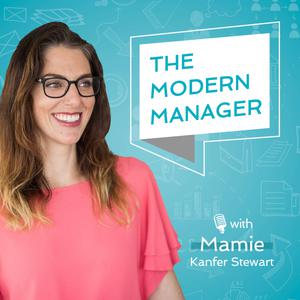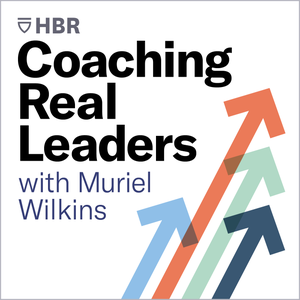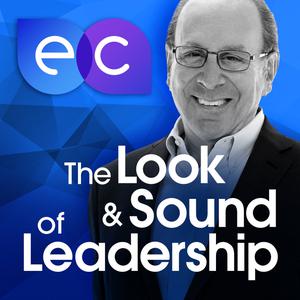
Coaching for Leaders
Dave Stachowiak
Discover leadership wisdom through insightful conversations
- 38 minutes 53 seconds680: Becoming More Coach-Like, with Michael Bungay Stanier
Michael Bungay Stanier: The Coaching Habit
Michael Bungay Stanier is the author of eight books, including The Coaching Habit*, which has sold more than a million copies and is the best-selling book on coaching this century. He is the founder Box of Crayons, a learning and development company that’s trained thousands of people around the world to be more coach-like. His TEDx Talk on Taming Your Advice Monster has been viewed more than a million times.
One of the most common desires leaders espouse is wanting to get better at helping others grow. One great way to do that is to become more coach-like. In this conversation, Michael and I explore how we can do better at building this skill.
Key Points
- Care deeply for others while also being disconnected from their outcomes. Give people responsibility for their own freedom.
- Consider asking, “How much risk are you willing to take?” Allow the other party to define the boundaries.
- Bring a difficult observation as a third point. Separate the message from the person and let them decide what’s true.
- Avoid asking “why” questions of others to avoid putting people on the defensive and trying to solve their problems.
- A helpful checkpoint: is this question something that’s helping me or helping the other party?
- Silence is a measure of success. When you ask as question that lands, people need time to answer.
- Your body leads your brain. Notice your physical presence and how it manifests when you’re listening well.
Resources Mentioned
- The Coaching Habit* by Michael Bungay Stanier
- Register your book receipt for bonus items from Michael
Interview Notes
Download my interview notes in PDF format (free membership required).
Related Episodes
- These Coaching Questions Get Results, with Michael Bungay Stanier (episode 237)
- Leadership in the Midst of Chaos, with Jim Mattis (episode 440)
- How to Lead Better Through Complexity, with Jennifer Garvey Berger (episode 613)
- How to Help Others Be Seen and Heard, with Scott Shigeoka (episode 654)
Discover More
Activate your free membership for full access to the entire library of interviews since 2011, searchable by topic. To accelerate your learning, uncover more inside Coaching for Leaders Plus.
13 May 2024, 3:00 am - 34 minutes 23 seconds679: Make it Easier to Discuss Hard Things, with Jeff Wetzler
Jeff Wetzler: Ask
Jeff Wetzler is co-CEO of Transcend, a nationally recognized innovation organization, and an expert in learning and human potential. His experience spans 25+ years in business and education, as a management consultant to top corporations, a learning facilitator for leaders, and as Chief Learning Officer at Teach For America.
He is a member of the Aspen Global Leadership Network and is an Edmund Hillary Fellow. Jeff is the author of Ask: Tap Into the Hidden Wisdom of People Around You for Unexpected Breakthroughs in Leadership and Life*.
Leaders are not the only people who need to have difficult conversations in the workplace. Yet, leaders set the tone for how much people are willing and able to talk about hard things. In this episode, Jeff and I discuss how leaders can make it easier for those important conversations to happen.
Key Points
- In one study of managers, most people admitted to remaining silent with their bosses and nearly 75% said colleagues also felt uncomfortable speaking up.
- Meet people on their own turf. Others are more likely to speak up if they are in a setting that’s more comfortable for them.
- Leaders should consider shifting timing and/or medium to one that’s of the preference for the person who doesn’t have power.
- Explain why you’re asking about a topic and your intention for a conversation at the start. Providing context prevents people from having to guess at your agenda.
- Set a mutual agenda for a conversation by asking a question like, “In addition to this, what else should be part of our conversation today?”
- Establish a tone for open communication by radiating resilience. Words like these might help: “If I were in your shoes, I might be feeling frustrated or even resentful. If that’s how you’re feeling, I would understand completely. Please don’t hold back.”
Resources Mentioned
- Ask: Tap Into the Hidden Wisdom of People Around You for Unexpected Breakthroughs in Leadership and Life* by Jeff Wetzler
Interview Notes
Download my interview notes in PDF format (free membership required).
Related Episodes
- How to Ask Better Questions, with David Marquet (episode 454)
- The Way Out of Major Conflict, with Amanda Ripley (episode 529)
- How to Grow From Your Errors, with Amy Edmondson (episode 663)
Discover More
Activate your free membership for full access to the entire library of interviews since 2011, searchable by topic. To accelerate your learning, uncover more inside Coaching for Leaders Plus.
6 May 2024, 3:00 am - 38 minutes 11 seconds678: The Power of Unlearning Silence, with Elaine Lin Hering
Elaine Lin Hering: Unlearning Silence
Elaine Lin Hering is a facilitator, speaker, and writer who helps people build skills in communication, collaboration, and conflict management. She is a former Managing Partner of Triad Consulting Group and Lecturer on Law at Harvard Law School, specializing in dispute resolution, mediation, and negotiation. She is the author of Unlearning Silence: How to Speak Your Mind, Unleash Your Talent, and Live More Fully.
Those of us who have struggled to speak up have been told, “Just be more confident,” or, “Say this to get started.” As Elaine and I discuss in this conversation, there’s a larger context at play…and great power for both leaders and the people they lead, in unlearning silence.
Key Points
- Start with why. For change to actually happen, find something that matters more than the old behavior.
- What seems obvious to us isn’t always obvious to others. Connecting the dots for others demonstrates the meaning you’re making.
- Beginning a thought with, “From where I sit…” provides a entry point for what you need to say while also acknowledging different perspectives from others.
- Most people want to be helpful, but don’t always know how. Tell them how they can be helpful in the moment.
- Resistance is part of the process of influencing others. While it doesn’t feel good in the moment, it’s often the catalyst for creating movement.
Resources Mentioned
- Unlearning Silence: How to Speak Your Mind, Unleash Your Talent, and Live More Fully* by Elaine Lin Hering
Interview Notes
Download my interview notes in PDF format (free membership required).
Related Episodes
- How to Speak Up, with Connson Locke (episode 546)
- End Imposter Syndrome in Your Organization, with Jodi-Ann Burey (episode 556)
- The Mindset Leaders Need to Address Burnout, with Christina Maslach (episode 608)
Discover More
Activate your free membership for full access to the entire library of interviews since 2011, searchable by topic. To accelerate your learning, uncover more inside Coaching for Leaders Plus.
29 April 2024, 3:00 am - 39 minutes 49 seconds677: How Leaders Can Better Support High-Achieving Women, with Sohee Jun
Sohee Jun
Sohee Jun is a leadership coach for female executives, leaders, founders, and entrepreneurs. She is also a TEDx speaker, Forbes Coaches Council member, keynote speaker, leadership development expert, and author. With over twenty years in the corporate world, she has worked with Fortune 500 companies, including those in the entertainment, production, and media sectors such as Netflix, Fox, and Disney.
In 2020, Sohee released her first book, Mommytracked: How to Take Authentic Risks and Find Success on Your Terms, with the goal of helping ambitious women tap into their inner core throughout the different phases of their lives. She’s now the author of a second book, The Inner Game: Secrets of High-Achieving Women for Navigating Work, Life, and Mindset*.
In a world where still too few women are represented in senior leadership roles, many of us want to do whatever we can to support high-achieving women. In this conversation, Sohee and I explore what her research and experience indicates that leaders can do to better support women in their careers.
Key Points
- Leaders can support both women and men by framing the larger “why” or North Star. Providing context helps a point of focus to emerge.
- Do it afraid. Provide support to work through fearful situations with success.
- When supporting women in building confidence, help them recognize what they’ve already achieved.
- Normalize the discussion about financial literacy. Opening the door to dialogue around salary negotiation helps equalize the salary gap.
- One question can set the tone for better work and life integration. Leaders can proactively ask about boundaries.
Resources Mentioned
- The Inner Game: Secrets of High-Achieving Women for Navigating Work, Life, and Mindset* by Sohee Jun
Interview Notes
Download my interview notes in PDF format (free membership required).
Related Episodes
- How to Prioritize, with Christy Wright (episode 545)
- How to Protect Your Confidence, with Nate Zinsser (episode 573)
- The Path Towards Your Next Promotion, with Adam Bryant (episode 653)
Discover More
Activate your free membership for full access to the entire library of interviews since 2011, searchable by topic. To accelerate your learning, uncover more inside Coaching for Leaders Plus.
22 April 2024, 3:00 am - 39 minutes 11 seconds676: How to Change People’s Minds, with Michael McQueen
Michael McQueen: Mindstuck
Michael McQueen has spent the past two decades helping organizations and leaders win the battle for relevance. He specializes in helping clients navigate uncertainty and stay one step ahead of change.
Michael is a bestselling author of nine books and a familiar face on the international conference circuit, having shared the stage with the likes of Bill Gates, Dr. John C. Maxwell, and Apple co-founder Steve Wozniak. Having formerly been named Australia’s Keynote Speaker of the Year, he has been inducted into the Professional Speakers Hall of Fame. He is the author of Mindstuck: Mastering the Art of Changing Minds*.
There’s a lot of evidence that our minds would rather feel right than be right. How then, do you influence someone when they are really convinced of their position? In this conversation, Michael and I discuss the initial steps that help in changing people’s minds.
Key Points
- Our tendency is to convince to the inquiring mind, but we’ll do better if we speak to the instinctive mind first.
- Help others lessen loss and maintain dignity by preserving titles, language, and symbols in things that are new.
- Instead of trying making an argument, ask a question that allows the other person to listen to themselves.
- Ask questions that clarify points of resistance or misunderstanding.
- Speak like you’re right, listen like you’re wrong.
Resources Mentioned
- Mindstuck: Mastering the Art of Changing Minds* by Michael McQueen
Interview Notes
Download my interview notes in PDF format (free membership required).
Related Episodes
- The Way to Influence Executives, with Nancy Duarte (episode 450)
- Four Habits That Derail Listening, with Oscar Trimboli (episode 500)
- Three Practices for Thriving in Negotiations, with William Ury (episode 669)
Discover More
Activate your free membership for full access to the entire library of interviews since 2011, searchable by topic. To accelerate your learning, uncover more inside Coaching for Leaders Plus.
15 April 2024, 3:00 am - 30 minutes 52 seconds675: How to Be a Better Ally, with Lauren Wesley Wilson
Lauren Wesley Wilson: What Do You Need?
Lauren Wesley Wilson is a leading thought leader on media relations, diversity and inclusion, and crisis communications. At 25, she became the founder and CEO of ColorComm Corporation. Prior to that, Lauren worked as a communications strategist at a prestigious crisis communications firm in Washington, D.C.
Lauren has been featured in The Washington Post, Forbes, and People, as well as on MSNBC and CNBC, and more. She has been recognized by PR Week’s 50 Most Powerful in PR, Ad Age’s Women to Watch, and New York Women in Communications. She is the author of What Do You Need?: How Women of Color Can Take Ownership of Their Careers to Accelerate Their Path to Success*.
Many of us wish to be good allies in the workplace, especially to those who are underrepresented. Yet, what we assume that means isn’t always what’s most wanted or needed. In this conversation, Lauren and I discuss what leaders and peers can do to be better allies.
Key Points
- Instead of asking “How can I help?” consider, “What do you need?” That’s more likely to generate specific actions.
- Women of color feel like they are putting in tons of work into relationships with the majority culture, but it often feels unreciprocated.
- White folks think of allyship as speaking out against discrimination. Women of color say it’s way more critical to advocate for new opportunities.
- Tie allyship to economic goals: conference attendance, nominations for recognition, inclusion on high-profile committees, and position/promotion considerations.
- Make invitations to people of color to be at the table. This contributes more substantially than proclamations of support.
- When you make a mistake, apologize, own it, and move on. Don’t tell a story to explain yourself.
Resources Mentioned
- What Do You Need?: How Women of Color Can Take Ownership of Their Careers to Accelerate Their Path to Success* by Lauren Wesley Wilson
Interview Notes
Download my interview notes in PDF format (free membership required).
Related Episodes
- The Way Managers Can be Champions for Justice, with Minda Harts (episode 552)
- End Imposter Syndrome in Your Organization, with Jodi-Ann Burey (episode 556)
- How to Respond Better When Challenged, with Dolly Chugh (episode 615)
Discover More
Activate your free membership for full access to the entire library of interviews since 2011, searchable by topic. To accelerate your learning, uncover more inside Coaching for Leaders Plus.
8 April 2024, 3:00 am - 28 minutes 4 seconds674: Principles for Using AI at Work, with Ethan Mollick
Ethan Mollick: Co-Intelligence
Ethan Mollick is a professor of management at Wharton, specializing in entrepreneurship and innovation. His research has been featured in various publications, including Forbes, The New York Times, and The Wall Street Journal.
Through his writing, speaking, and teaching, Ethan has become one of the most prominent and provocative explainers of AI, focusing on the practical aspects of how these new tools for thought can transform our world. He’s the author of the popular One Useful Thing Substack and also the author of the book, Co-Intelligence: Living and Working with AI*.
Whether you’ve used it or not, you’ve heard that AI will transform how we work. Given how quickly the technology is changing, how do you start and, if you’ve started already, what’s the way to use it well? In this conversation, Ethan and I discuss the principles for using AI, even as the technology changes.
Key Points
- GPT-4 is already passing the bar examination in the 90th percentile, acing AP exams, and even passing the Certified Sommelier Examination.
- Always invite AI to the table. It’s may be helpful, frustrating, or useless — but understanding how it works will help you appreciate how it may help or threaten you.
- Being the “human in the loop” will help you catch where AI isn’t accurate or helpful. Zeroing in on areas where you are already an expert will help you appreciate where AI is useful and where its limitation emerge.
- Treat AI like a person, but tell it what kind of person it is. It’s helpful to think of AI like an alien person rather than a machine.
- Assume this is the worst AI you will ever use. Embracing that reality will help you stay open to possibilities on how you use AI do your work better.
Resources Mentioned
- Co-Intelligence: Living and Working with AI by Ethan Mollick
Interview Notes
Download my interview notes in PDF format (free membership required).
Related Episodes
- How to Build an Invincible Company, with Alex Osterwalder (episode 470)
- Doing Better Than Zero Sum-Thinking, with Renée Mauborgne (episode 641)
- How to Begin Leading Through Continuous Change, with David Rogers (episode 649)
Discover More
Activate your free membership for full access to the entire library of interviews since 2011, searchable by topic. To accelerate your learning, uncover more inside Coaching for Leaders Plus.
1 April 2024, 3:00 am - 39 minutes 25 seconds673: The Way to Prevent Being Duped, with Mike Caulfield
Mike Caulfield: Verified
Mike Caulfield is a research scientist at the University of Washington’s Center for an Informed Public, where he studies the spread of online rumors and misinformation. He has taught thousands of teachers and students how to verify claims and sources through his workshops. His SIFT methodology is taught by hundreds of research libraries across North America, and a shorter version of SIFT instruction, developed with Google, has been taught in public libraries across the world.
His work on Web Literacy for Student Fact-Checkers, won the Merlot Award for best open learning resource in the ICT category. His work has been covered by The New York Times, the Chronicle of Higher Education, NPR, The Wall Street Journal, USA Today, and the MIT Technology Review. He is the author with Sam Wineburg of Verified: How to Think Straight, Get Duped Less, and Make Better Decisions about What to Believe Online*.
We’ve all seen something online that we thought was true, but turned out was a hoax. Annoying, but no big deal if it’s just an internet meme from a friend or family member. But what if what you find online isn’t at all what you thought and you make decisions or take action on it that affects your professional credibility? In this conversation, Mike and I discuss how to guard yourself from being duped.
Key Points
- Rather than asking, “Is this true?” the more useful question is, “Do I know what I’m looking at here?”
- The cheap signals many of us were trained to watch for (working links, attractive design, about pages, proper domains) are easy to replicate and no longer correlate to credibility.
- Phrase questions to search engines in neutral ways for less biased results. Instead of “Are soda taxes a good idea?” ask “Do soda taxes work?”
- While Wikipedia still has bias, it’s a far more credible source that many of us were taught — and a valuable source for a broad perspective of a topic or organization.
- Intelligent people often read vertically, to their detriment. The best fact-checkers read laterally by using the rest of the web to read the web.
- Watch for phrases like “sponsored content,” “brand partner,” “presented with,” “in partnership with,” “brought to you by,” “in association with,” or “hosted by.” These phrases signal advertisements.
Resources Mentioned
- Verified: How to Think Straight, Get Duped Less, and Make Better Decisions about What to Believe Online* by Mike Caulfield and Sam Wineburg
Interview Notes
Download my interview notes in PDF format (free membership required).
Related Episodes
- The Way to Make Better Decisions, with Annie Duke (episode 499)
- Get People Reading What You’re Sending, with Todd Rogers (episode 666)
- How to Enhance Your Credibility (audio course)
Discover More
Activate your free membership for full access to the entire library of interviews since 2011, searchable by topic. To accelerate your learning, uncover more inside Coaching for Leaders Plus.
25 March 2024, 3:00 am - 39 minutes 12 seconds672: Set the Tone for Speaking Up, with Mike Massimino
Mike Massimino: Moonshot
Mike Massimino is a former NASA astronaut and a professor of mechanical engineering at Columbia University. He’s also the senior advisor for space programs at the Intrepid Sea, Air & Space Museum. He was selected as an astronaut by NASA in 1996, and is the veteran of two space flights, the fourth and fifth Hubble Space Telescope servicing missions in 2002 and 2009.
Mike has made numerous television appearances, including a six-time recurring role as himself on the CBS hit comedy The Big Bang Theory. He has hosted Science Channel’s The Planets and its special Great American Eclipse. Mike is the author of the New York Times bestselling book Spaceman and now his newest book Moonshot: A NASA Astronaut’s Guide to Achieving the Impossible.
Almost every leader and organization invites people to speak up and make their voice head. As we all know, that doesn’t means it happens in practice. In this conversation, Mike and I discuss how leaders can set the tone for what’s said, and what’s not.
Key Points
- You’ll know when it’s time to speak up. Your cue is that hair-raising, sinking feeling in the moment of a high-stakes situation or the feeling of confusion in a less intense situation.
- Outsiders and rookies are often the most observant people in the team since they are hyper-aware of doing something new and noticing details a veteran may miss.
- It’s important to speak up when you see something wrong, but equally important is to speak up when you do something wrong. The only unforgivable sin at NASA is trying to cover something up.
- Your title or position may influence how others in the organization speak up (or don’t). When someone speaks up, saying “thank you” in the moment sets the tone for future dialogue.
- Reward speaking up with incentives. The Hubble Space Telescope servicing manager created challenges for people to speak up to reduce spacewalk time.
Resources Mentioned
- Moonshot: A NASA Astronaut’s Guide to Achieving the Impossible by Mike Massimino
Interview Notes
Download my interview notes in PDF format (free membership required).
Related Episodes
- How to Start Managing Up, with Tom Henschel (episode 433)
- How to Speak Up, with Connson Locke (episode 546)
- How to Help People Speak Truth to Power, with Megan Reitz (episode 597)
Discover More
Activate your free membership for full access to the entire library of interviews since 2011, searchable by topic. To accelerate your learning, uncover more inside Coaching for Leaders Plus.
18 March 2024, 3:00 am - 33 minutes 25 seconds671: How to Recognize Remarkable People, with Guy Kawasaki
Guy Kawasaki: Think Remarkable
Guy Kawasaki is the chief evangelist of Canva and the creator of Guy Kawasaki’s Remarkable People podcast. He is an executive fellow of the Haas School of Business (UC Berkeley), and adjunct professor at the University of New South Wales.
He was the chief evangelist of Apple and a trustee of the Wikimedia Foundation. He has written Wise Guy, The Art of the Start 2.0, The Art of Social Media, Enchantment, and eleven other books. He’s now the author of Think Remarkable: 9 Paths to Transform Your Life and Make a Difference.
We all want to be surrounded by remarkable people in our work. A key piece to building relationships with them is recognizing when they come across our radar screens. In this conversation, Guy and I explore some of the key indicators for recognizing remarkable people.
Key Points
- Remarkable people reflect back to childhood. They recognize the experiences and people that contributed to their success.
- Remarkable people don’t find their passions, they develop them. They know that it’s rarely love at first sight.
- Remarkable people aren’t trying to save the world. They start with small and simple questions that scratch an itch.
- Remarkable people make themselves indispensable. The the do work nobody else wants to do which separates them from the pack.
- Remarkable people interact with a diverse group of people. They want to hear different perspectives and recognize the diversity makes them better.
- Remarkable people have overcome hardships. They’ve challenged themselves to find paths forward through the toughest situations.
Resources Mentioned
Interview Notes
Download my interview notes in PDF format (free membership required).
Related Episodes
- How to Lead and Retain High Performers, with Ruth Gotian (episode 567)
- How to Strengthen Your Network, with Marissa King (episode 525)
- Help Your Team Embrace Growth Mindset, with Eduardo Briceño (episode 644)
Discover More
Activate your free membership for full access to the entire library of interviews since 2011, searchable by topic. To accelerate your learning, uncover more inside Coaching for Leaders Plus.
11 March 2024, 3:00 am - 40 minutes 15 seconds670: How to Connect with People Better, with Charles DuhiggCharles Duhigg: Supercommunicators Charles Duhigg is a Pulitzer Prize–winning investigative journalist and the author of The Power of Habit and Smarter Faster Better. A graduate of Harvard Business School and Yale College, he is a winner of the National Academies of Sciences, National Journalism, and George Polk awards. He writes for The New Yorker and other publications, and is host emeritus of the Slate podcast How To! He's the author of Supercommunicators: How to Unlock the Secret Language of Connection*. We all know that we can’t lead if we don’t connect. The best leaders not do this well, but they do it consistently with all kinds of people. In this conversation, Charles and I discuss what we can learn from the best communicators to get better ourselves. Key Points Neural entrainment is when we click with someone and can finish each other’s sentences (and even our biological responses align). Supercommunicators trigger this consistently across many kinds of relationships. Supercommunicators aren’t always loudest or leading the conversation, but they ask more questions and adapt better in the moment. Make emotional replies easier for others. Instead of, “Do you have any hobbies?” ask, “If you could learn anything, what would it be?” Reciprocation of emotion is key for people to connect well. When another party is sharing something joyful, that’s an opportunity to share yourself. When something is more contentious, loop for understanding by (1) asking a deeper question, (2) repeating back in your own words, and (3) asking if you got it right. Resources Mentioned Supercommunicators: How to Unlock the Secret Language of Connection* by Charles Duhigg Interview Notes Download my interview notes in PDF format (free membership required). Related Episodes Where You May Be Provoking Anxiety, with Erica Dhawan (episode 528) The Way to Get People Talking, with Andrew Warner (episode 560) How to Help Others Be Seen and Heard, with Scott Shigeoka (episode 654) Discover More Activate your free membership for full access to the entire library of interviews since 2011, searchable by topic. To accelerate your learning, uncover more inside Coaching for Leaders Plus.4 March 2024, 4:00 am
- More Episodes? Get the App
Your feedback is valuable to us. Should you encounter any bugs, glitches, lack of functionality or other problems, please email us on [email protected] or join Moon.FM Telegram Group where you can talk directly to the dev team who are happy to answer any queries.
 How to Be Awesome at Your Job
How to Be Awesome at Your Job
 The Modern Manager
The Modern Manager
 HBR IdeaCast
HBR IdeaCast
 Coaching Real Leaders
Coaching Real Leaders
 HBR On Leadership
HBR On Leadership
 The Look & Sound of Leadership
The Look & Sound of Leadership